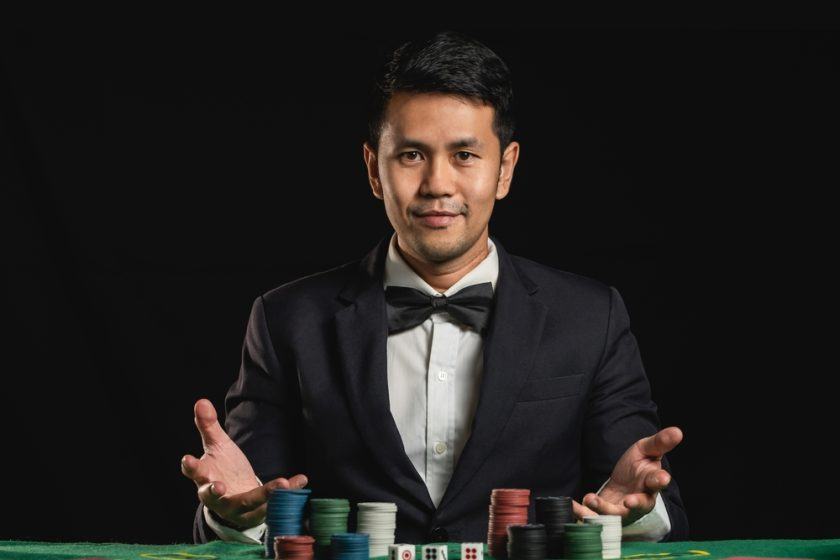Mastering Confidence: Overcoming Self-Doubt in Poker Decision-Making

Title Image Credit: WPixz/Shutterstock
What This Guide Offers Poker Players
This article is your blueprint for managing the emotional aftermath of poker mistakes and learning to trust your instincts at the table. You’ll discover how to:
- Recover gracefully from misplays and prevent them from derailing your future decisions
- Analyze your hands with objectivity rather than self-criticism
- Coach yourself with the same balanced feedback you’d give a fellow player
- Cultivate steady focus and aim for progress, not flawless perfection
- Transform self-doubt into a catalyst for growth and poker mastery
The Emotional Toll of Poker Mistakes
Imagine this: you call a hefty river bet, your opponent reveals the winning hand, and your chips slide away. Your heart sinks, your mind fills with regret, and the inner critic grows louder: “What was I thinking? I should have folded!”
If these thoughts sound familiar, you’re not alone. Even seasoned players struggle with feelings of embarrassment, anger, or disappointment after a mistake. The real danger comes when those negative emotions seep into your future play:
- You second-guess your reads and hesitate in key spots
- Your confidence shrinks and decision paralysis creeps in
- A nagging thought emerges-maybe you’re not good enough for this game
However, self-doubt isn’t inherently harmful. In fact, it shows you care about your performance and want to improve. The challenge is learning to process it constructively so it fuels your progress rather than sabotaging your mental game.

Image Credit: Roman Samborskyi/Shutterstock
The Cycle of Overcorrection: Rebuilding Trust After a Mistake
Take the story of Jake, a committed player who thrived for weeks-only to misplay a crucial hand during an important online tournament. One subtle board misread cost him his stack.
While the mistake was minor in the grand scheme, Jake’s confidence took a hit. In his next sessions, he began doubting his reads, becoming passive with strong hands, and hesitating in spots he’d previously navigated with ease.
The real risk of self-doubt is not the mistake itself, but how it can erode trust in your own ability and undermine the skills you’ve worked hard to build.
Why Self-Doubt Flourishes in Poker
Poker’s unique blend of skill and luck means that:
- Executing a technically sound play can still result in losing (bad beats)
- Making clear mistakes can sometimes be rewarded by chance
- Hand outcomes often fail to accurately reflect the quality of your decisions
The brain naturally craves certainty and closure. In poker, you rarely get it: you often fold without seeing your opponent’s cards, or lose with no clear indication of a misstep. Over time, the uncertainty causes us to associate mistakes with personal failure.
Often, ego plays a part too, masking fear as a drive for self-improvement. Thoughts such as “I should have known better,” or “Why can’t I get this right?” reflect internalized pressure, not reality.
Study Sessions and the Harmful Narrative of "I'm Not Good Enough"
Reviewing hands with modern solvers and software has its benefits, but many players fall into a psychological trap. Spotting a technical error-like an overzealous c-bet-can trigger thoughts of inadequacy: “If I can't get this simple spot right, how will I ever succeed?”
This pattern is common, even among dedicated and skilled players. Yet, recognizing your weaknesses should not be mistaken for failing. In reality, seeing your mistakes clearly is a sign that you’re moving forward, not falling behind.

Image Credit: nazarovsergey/Shutterstock
Trusting Your Instincts Versus Results-Based Doubt
Consider this scenario: you fold when you suspect a bluff, only to discover later you were right-or worse, wrong. Alternatively, you call a big bet against your better judgment and lose, feeling doubly foolish.
The tug-of-war between gut feel and seeking reassurance from hand results is exhausting. Without a system to assess decisions objectively, confidence crumbles:
- You conflate poor outcomes with poor thinking, regardless of your actual process
- Each bad result chips away at your inner trust, leading to more self-doubt
The most important mindset shift is learning to decouple your identity from outcomes. You can only control your thought process, not the cards or opponents’ hands. Real confidence stems from understanding and refining your reasoning, not the fleeting fortunes of the river card.
Turning Mistakes Into Learning Opportunities
Most players respond to errors in one of two ways: either by harshly criticizing themselves or ignoring the error’s lessons altogether. Neither approach encourages growth or builds self-trust.
Instead, treat errors as data points rather than damning judgments about your ability. Even elite professionals-like Phil Ivey, who famously misread a hand at the WSOP-make glaring mistakes. The difference is their ability to learn, move on, and not internalize the error as a personal shortcoming.
When you recognize a misstep, try shifting your mindset:
- What was my reasoning in this hand?
- What information influenced my decision at the time?
- Would I recommend a different approach to a fellow player?
This shift from judgment to curiosity is crucial for long-term progress.
Five Proven Techniques to Rebuild Confidence After Poker Mistakes
Rebuilding self-belief doesn't happen overnight. Use these practical strategies to reset your mindset and reinforce trust in your own decision-making:
1. Maintain a Process-Focused Journal
Don’t just record the hands where you win big or tilt in frustration. Document instances where:
- You thoughtfully considered all your options before acting
- You made disciplined folds, even without confirmation you were right
- Your decision process was sound, regardless of the outcome
Tracking these moments underscores the value of smart, repeatable processes over short-term results.

Image Credit: Roman Samborskyi/Shutterstock
2. Identify and Ground Your Emotions
When a blunder sparks frustration or embarrassment, quietly acknowledge it: “This is frustration, but I still have what it takes to play well.” Naming the emotion provides necessary distance, helping you return to a neutral mindset for your next decision.
3. Use Reset Rituals to Move On
Create a brief ritual to interrupt negative spirals after mistakes. Simple resets like repeating “Refocus. Next hand,” or practicing the 6-2-7 breathing technique (inhale for six counts, hold for two, exhale for seven) can quickly calm nerves and restore mental clarity.
4. Review Hands With a Scientist’s Curiosity
While analyzing past hands, replace harsh judgments-“I was so dumb”-with questions like:
- “What led me to make that choice?”
- “Was my logic based on flawed assumptions?”
- “How would an expert break down this spot?”
This fosters rational analysis, sharpens your skills, and keeps self-worth separate from results.
5. Offer Yourself the Same Support You’d Give Others
Ask yourself: if your poker study partner made this mistake, what advice would you give? Chances are, you’d offer encouragement, practical suggestions, and understanding. Apply this same balanced feedback to your own game and develop resilience rooted in self-compassion.
Conclusion: Shaping Doubt Into a Path Forward
Experiencing self-doubt is part of playing poker at any serious level. Instead of treating mistakes as proof of incompetence, accept them as stepping-stones toward skillful, consistent play.
Every instance where you pause for reflection instead of criticism, analyze your reasoning rather than your result, or place trust in your process despite lacking confidence-that’s genuine progress.
Remember, poker success isn’t forged in the absence of mistakes. It's earned by maintaining presence, composure, and a growth-focused mindset every time you sit at the table.













